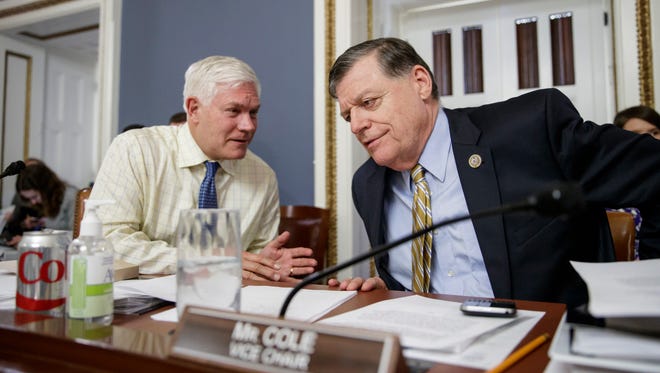Rules Committee slogs through Obamacare replacement
WASHINGTON — Democrats complained Wednesday that the final committee consideration for the GOP health care bill before Thursday's floor vote was being conducted without an updated analysis on the bill's price tag and affect on coverage.

Republicans on the House Rules Committee, which was expected to work into the evening, said they expected an analysis from the nonpartisan Congressional Budget Office before the end of the night.
The committee spent most of the day asking questions of the top members of the policy committees that worked on the rewrite of the Affordable Care Act, commonly referred to as Obamacare.
Rep. Jim McGovern, D-Mass., called the bill "a cruel joke to the most vulnerable among us." The CBO projected 24 million fewer people would have insurance under the original version of the bill by 2026 than they would under the ACA.
But Rep. Greg Walden, the Oregon Republican who chairs the House Energy and Commerce Committee, predicted the legislation would "far outperform what CBO says" and will give people new and better health care options.
Republicans modified the bill Monday to try to win more votes from both hardline conservatives concerned it doesn't go far enough to repeal Obamacare, and from moderates worried that too many people would lose coverage.
The changes include allowing states to require some Medicaid recipients to work. States could also receive Medicaid funding as a block grant, which wouldn’t increase with enrollment but comes with more spending flexibility.
The modified version also speeds up the GOP’s repeal of the tax hikes the 2010 Affordable Care Act imposed on the wealthy, sectors of the health care industry and others to pay for the 2010 law’s expansion of insurance.
“It’s a massive tax cut,” House Speaker Paul Ryan, R-Wis., said Tuesday. “All of those things were requests by these members.”
Read more:
The House health care battle: What's at stake?
Freedom Caucus claims enough votes to kill Obamacare repeal
As the House vote looms, here's everything you need to know about the GOP health care bill
To address the concerns of more moderate members, the modified version contains more Medicaid funding than originally proposed for the elderly and disabled. It also expands a tax deduction for medical expenses, which Republicans said the Senate could choose to keep or could replace with more generous tax subsidies for older people who purchase insurance on the individual market.
But it’s unclear whether the modified version has enough support to pass the House against united Democratic opposition. And Republicans have less margin for error in the closely divided Senate, where several Republicans oppose the House bill.
Conservative groups such as Heritage Action and the Club for Growth are lobbying against the bill. It's also opposed by other powerful groups including AARP and the American Medical Association.
“Although Speaker Ryan acknowledged serious concerns from older Americans, the response to their concerns is not enough and we will hold members of Congress accountable for their vote on the bill," said John Hishta, AARP senior vice president. "Older Americans would be worse tomorrow if this bill passed today as they would see much higher health care costs."
The nonpartisan Congressional Budget Office estimated that, under the original version, the uninsured rate for the nonelderly population would increase from 10% under the ACA to 19%. The change would disproportionately affect older and poorer Americans.
Timothy Jost, an expert on health law at Washington and Lee University, doubts CBO’s coverage estimate would change much under the revised bill. But because of increased spending and faster repeal of the taxes, he expects much of the $337 billion in deficit reduction the original version included would disappear.
Major components of the original bill that were not changed include phasing out the ACA’s expansion of Medicaid to those earning up to 138% of federal poverty, about $16,400 for one person. Overall Medicaid funding would also be reduced, as would the ACA’s subsidies to help people buy insurance if they don’t qualify for a government program and aren’t offered coverage through an employer.